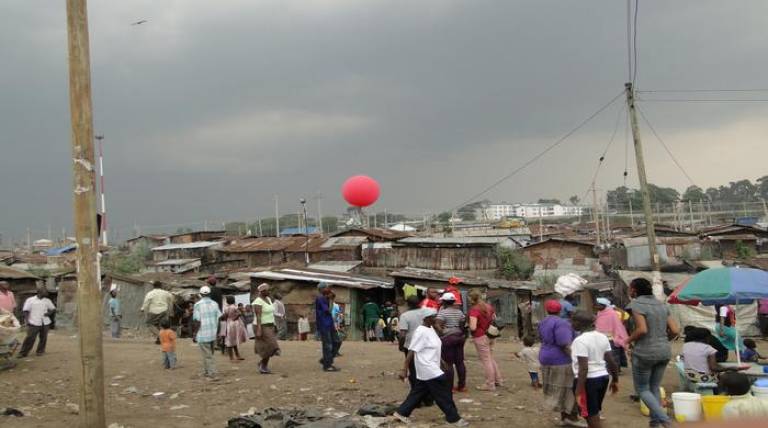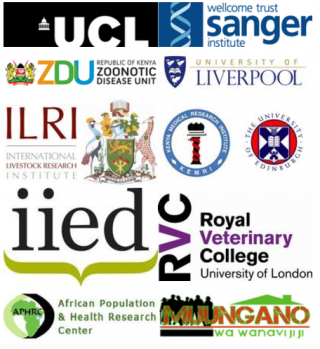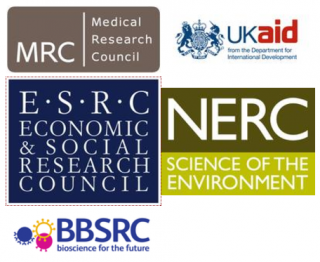The overall objective of this project is to understand the mechanisms that may lead to the introduction of pathogens into urban populations and their subsequent spread in Nairobi, Kenya.

Overview
Epidemiology, ecology and socio-economics of disease emergence in peri-urban Nairobi (Urban Zoo project)
Funded primarily by the Medical Research Council (MRC-UK) , other UK Research Councils and the UK Government's Living With Environmental Change Initiative, we are undertaking a research programme on the "Epidemiology, ecology and socio-economics of disease emergence in Nairobi” (shortly titled as Urban Zoo). Led by Professor Eric Fèvre, from the Institute of Infection and Global Health(IGH), University of Liverpool who is also currently jointly based at the International Livestock Research Institute (ILRI), Nairobi, Kenya. The project is organised around 12 partner institutions in the UK and Kenya (for more details, see the project website ).
The overall objective is to understand the mechanisms that may lead to the introduction of pathogens into urban populations and their subsequent spread in Nairobi, Kenya. The focus is on livestock as sources of these pathogens, and livestock pathogens, through the close interactions between livestock, their products and people, who are at high risk of crossing the species barrier. The focus in this project is on Escherichia coli (E Coli), as an example of many potential emerging pathogens, which exists in a diversity of hosts, in the environment, on food, in waste, and so on. The project seeks to understand the mechanisms by combining livestock commodity value chain analysis with a public health, environmental, social, genetic and ecological characterisation of Nairobi, a completely novel approach of mapping the city.
For more information see: http://www.zoonotic-diseases.org/project/urban-zoo-project/
- Funders and Partners
The project secured its funding through coordinated efforts from the UK Government and UK research Councils , primarily that of the Medical Research Council (UK), through the Living With Environmental Change Initiative that led to Funded by the UK Medical Research Council through the “Environmental and Social Ecology of Human Infectious Diseases” (ESEI) programme.
Apart from primary funding of the project from MRC, the team also secured co-funding from the Department for International Development (UKAID) which enabled them to involve more partners that include Muungano wa Wanavijiji, the Kenyan federation of the Urban Poor, and City and Regional Planning, University of California Berkley, USA.
Partners

Funders

- Planning, Policy & Social Sciences Team
The Planning, policy and social sciences thread of the project comprises of colleagues from Development Planning Unit (DPU), and Civil, Environmental & Geomatic Engineering (CEGE) at the University College London (UCL) , and from International Institute for Environment and Development (IIED), London, United Kingdom.
Staff members involved:
Sohel Ahmed, the postdoctoral researcher, at DPU, UCL.
Professor Julio D Davila, Director, DPU, UCL.
Professor Adriana Allen, DPU, UCL.
Professor Muki Haklay, CEGE, UCL
Cecilia Tacoli PhD, Human Settlements Group, IIED.
The staff involved in this team contribute to the overall multidisciplinary efforts of the Urban Zoonoses project by asking pertinent questions that allows measuring, mapping, monitoring environmental drivers and analysing structural drivers behind the emergence of zoonotic and food-borne diseases in urban and peri-urban Nairobi, Kenya.
In particular we are exploring human-environment interfaces in selected low income areas of Nairobi, with specific attention to how local environmental hazards interact with food preparation/consumption and socio-spatial livestock keeping practices, and how this in turn may result in greater exposure and vulnerability by people and places to potential exposure to certain zoonotic diseases.
We are also critically analysing relevant policies, institutional and everyday practices that are entrenching socio-spatial dimensions of environmental and health inequity in the city, and also how those practices are influencing access to land for formal-informal livestock keeping and defining livestock typologies in and around the city.
Our section in the main project site is available from this link.
- Resources
Publications
- Sohel Ahmed, Edwin Simiyu, Grace Githiri, Alice Sverdlik, Shadrack Mbaka (2015). Cooking up a storm: Community-led mapping and advocacy with food vendors in Nairobi’s informal settlements, Human Settlement Group Working paper, IIED, London, UK. 40pp.
- Sohel Ahmed, Edwin Simiyu, Grace Githiri, Adrienne Acioly, Shadrack Mbaka, Irene Karanja, and Leonard Kigen (2013) Dining with less danger: mapping food and environmental hazards in Mathare, Nairobi
Conferences/invited talks
Sohel Ahmed, Adriana Allen, Cecilia Tacoli, Julio Davila and Muki Haklay (2015) Putting food first: narrating, mapping and analysing food-environment- society nexus in informal settlements of Nairobi . Special session on Perceptions of Urban Environmental Health: Narrating Political Ecologies of Disease, in the Dimensions of Political Ecology (DOPE) Conference, 26-28 February, University of Kentucky, Lexington, US.
Sohel Ahmed , Muki Haklay , Adriana Allen , Cecilia Tacoli , Edwin Simiyu and Julio Davila (2015) Participatory mapping for transformation: multiple visual representation of foodscapes and environment in informal settlements in Nairobi. GIS Research UK Conference, University of Leeds, 14-17 April, Leeds, UK.
Sohel Ahmed, Djesika Amendah , Nicholas Ngomi and Julio Davila (2015) Health premium for whom in the city? Comparing Health equity through the lens of social and spatial determinants in formal-informal settlements in Nairobi. International Conference on Urban Health 2015, 24-27 May Dhaka, Bangladesh.
Eric Fevre, Sohel Ahmed and Laure Made (2014) Forces of urbanisation that drive zoonoses emergence in global South . Special Session on Transdisciplinarity in urban health, 11th International Urban Health Conference, 4-7th March, Manchester, UK
(Invited Talk) Sohel Ahmed and Cecilia Tacoli (2014) Mapping Food Safety and Environmental Hazards: what difference do community-led initiatives make? In the Workshop on Global Public Health: The potential of social networks, participatory systems and context-aware data, Festival of Digital Health , UCL. 2nd July 2014, London.
(Invited talk) Julio Davila, Sohel Ahmed and Eric Fevre (2014) Rapid urbanization and new zoonotic diseases: The challenge of inter-disciplinary research, 21-OCT-2014 , UNAM, Mexico.
(Invited talk)Sohel Ahmed (2014) Linking food and environment in informal settlements in Nairobi. Food Consumption, Urbanisation and Rural Transformation, IIED, London 3-5 December 2014.
Blogs
DPU
5 Feb 2014: Field research in Nairobi for collaborative 'Urban Zoonoses' project
17 April 2014: Mapping Relationships between Food Safety and Environmental Hazards in Nairobi
IIED
31 March 2014: Up in the air: Citizen scientists map food dangers in Nairobi
virtual working paper that IIEd did in consultation with Sohel Ahmed: http://www.iied.org/mapping-for-food-safety
From the Kenyan Federation
4 April 2014: Food Safety in Nairobi informal settlements
15 April 2014: Dining with less danger: mapping food and environmental hazards in Mathare, Nairobi
5 May 2014: Traps of urban food insecurity and safety: Kibera reflection
8 Oct 2014: Spotting the Invisible Risks to Food and Health in Nairobi’s Slums
EEESI blog
https://eehiesei.wordpress.com/
Other Resources
Advocacy for Neglected Zoonotic diseases: ADVANZ
Some interactive introductions on neglected zoonoses of Africa:
http://oh-advocacy.avia-gis.com/
http://www.who.int/neglected_diseases/zoonoses/infections_more/en/
 Close
Close

